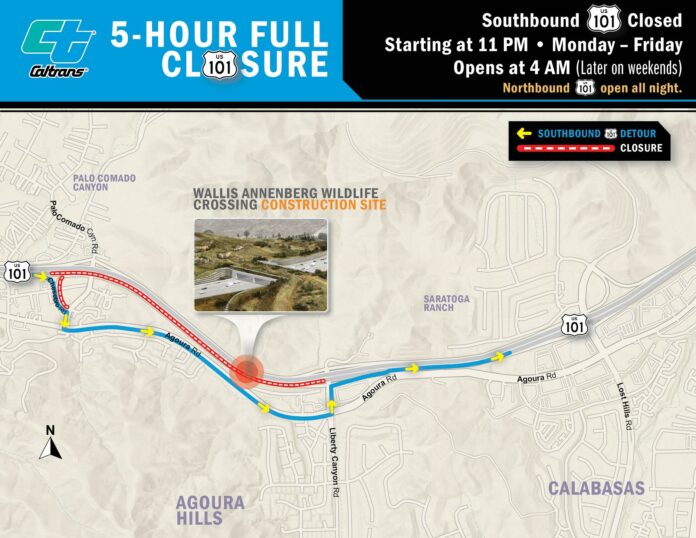New phase of construction for wildlife crossing
Upcoming overnight closures on Highway 101 in Agoura Hills are signaling a major milestone for the world’s largest wildlife crossing right in Malibu’s own backyard.
The Wallis Annenberg Wildlife Crossing in Agoura Hills started construction nearly two years ago. The $90 million project funded through state and private agencies, along with individual contributions, is being built by Caltrans, which is about to start the complex process of installing the large-scale concrete beams that will be the first horizontal supports for the crossing. Caltrans’s plan includes placing the girders late at night as well as other measures to make the process as convenient as possible for highway users.
Beginning around April 16, Caltrans will close half of Highway 101, all lanes in one direction beginning at midnight. Closures will occur on Monday through Friday nights until 5 a.m. each night; only one direction of the freeway will be completely closed. Lanes in the opposite direction will stay open for traffic and there are easy detours at Liberty Canyon.
The entire process of placing these concrete beams is expected to take from 30 to 45 days to complete and will feature the placement of a total of 82 concrete beams, or girders, across all 10 lanes of the freeway. The girders, long boxes of reinforced concrete, will become the first level of the wildlife crossing’s multilayered structure above and across one of the nation’s busiest freeways.
To avoid lengthy closures of the freeway, the girders were manufactured off-site in Riverside County and large trucks will transport them to the construction site at Liberty Canyon. Each girder over the northbound lanes is 103 feet long and weighs 140 tons. Each girder over the southbound lanes is more than 93 feet long and weighs over 126 tons. For context, the weight of just one girder is equivalent to the weight of more than 14 African elephants according to Save The Cougars, one of the nonprofits supporting the project.
Agoura Hills Mayor Illece Buckley Weber told The Malibu Times, “Within the next month, the girders will be placed across the Wallis Annenberg Wildlife Crossing, bringing the longtime vision for a safe crossing closer to fruition. This is an incredibly exciting step for wildlife conservation and for the residents of the region.”
“We are very excited to celebrate this big milestone in the construction of the Wallis Annenberg Wildlife Crossing. With the placement of the horizontal supports, the structure is truly going to start looking like the bridge it will become,” said Beth Pratt, California regional executive director for the National Wildlife Federation. “We know that closures of the freeway do have impacts on traffic and the community, and we apologize for any inconvenience this may cause. Caltrans has a thorough plan for detours, and we trust their excellent team to manage this to minimize disruption. And these ‘closures for cougars’ are for a good cause: helping to save the area mountain lions from extinction and ensuring a future for all wildlife in the Santa Monica Mountains.”
Not only will mountain lions benefit from the crossing, the visionary bridge will help other wildlife, including bobcats, birds, lizards, mule deer, and more travel safely across one of the busiest highways in the country. The huge undertaking is to support local biodiversity, expand refuge for critical pollinator species, and prevent the extinction of the local mountain lion population. Beyond the robust engineering it relies on, a sophisticated ecological restoration plan will create a habitat across the surface of the crossing and in approximately 12 acres of open space, alongside it. These new native wildlife habitats will reinforce the biodiversity of the Santa Monica Mountains and provide the shelter, food, and water the dozens of area wildlife species, need to thrive. The crossing will be the largest of its kind in the world, a first in California, and a global model for urban wildlife conservation.
Cougar supporters say the bridge is urgently needed. As many as 70 mountain lions were struck and killed on California roadways last year. The Los Angeles Times reported the lions are being killed faster than they can reproduce.
Completion is scheduled for the end of 2025 or early 2026.


